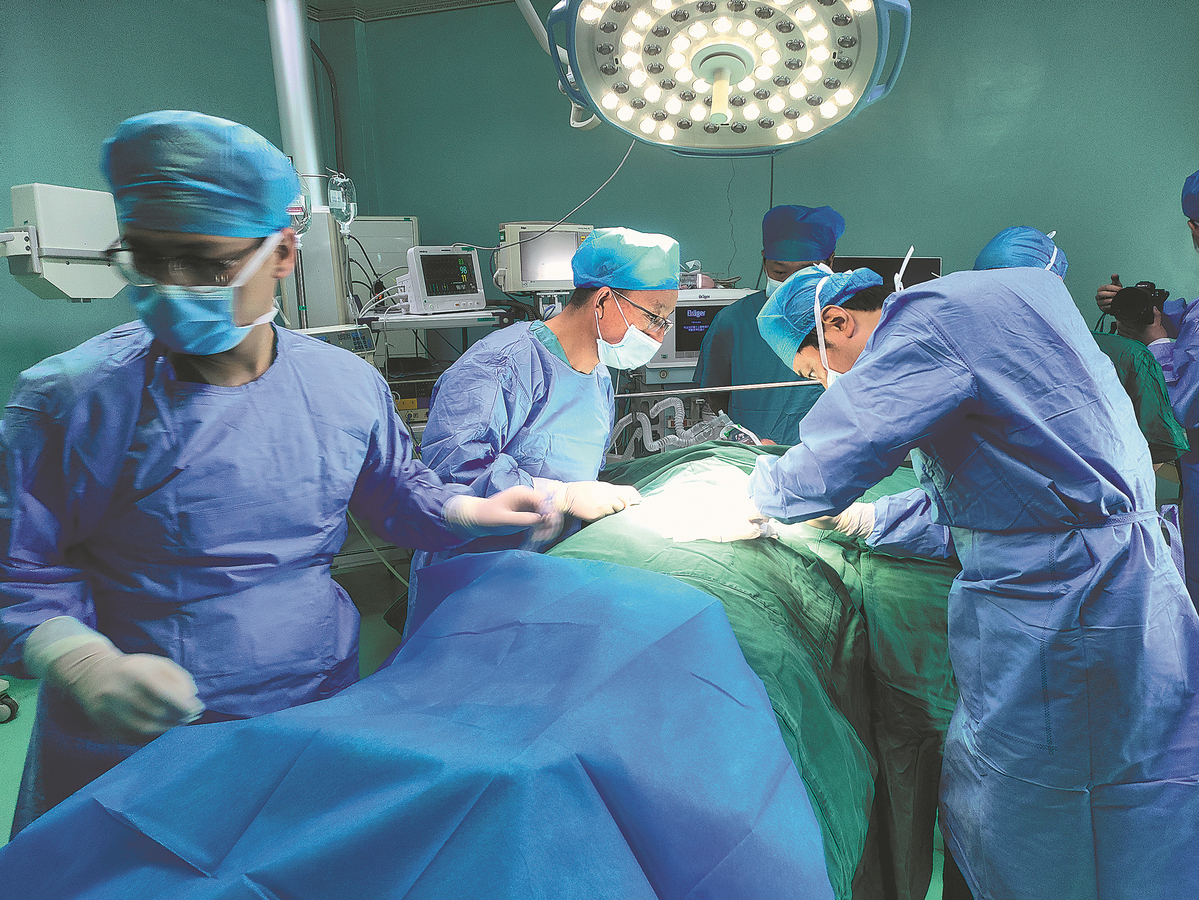
Wang Ye (right), an orthopedics expert from Wuxi People's Hospital, performs surgery on an injured patient in Xunhua county, Qinghai province, following the Jishishan earthquake in December 2023. CHINA DAILY
When Zhang Lingling walked into the Haidong No 2 People's Hospital in September, she could barely walk due to constant pain in her groin that had disrupted her daily life for months.
An operation at the hospital marked a turning point for her.
With the help of cutting-edge technology such as 3D-printed titanium implantation, the 45-year-old underwent a revision surgery that, a few years ago, would not have been possible in Haidong, Qinghai province.
"I never imagined they'd be able to handle something this complex," said Zhang, whose medical troubles involved a loosened hip implant and severe bone loss.
Now she's back on her feet and focusing on rehabilitation exercises.
"I'm grateful to have had the operation successfully here at home," Zhang said.
Xu Facai, director of the orthopedics department at the Haidong hospital, said: "Zhang's case was challenging. Her condition was extremely difficult to address with conventional methods. The 3D-printed materials were custom-designed for her, something we couldn't have achieved without the guidance and resources from Wuxi."
Xu was referring to the critical support Haidong has received from medical professionals from Wuxi, Jiangsu province, who have brought not only expertise but also fresh management philosophies.
Among them is Wang Ye, an orthopedics expert from Wuxi People's Hospital who worked in Haidong for nearly two years.
"Wang truly immersed himself in his work in Haidong," Xu said. "He's been more than a teacher. His efforts to integrate advanced technologies have made a difference."
Wang's dedication reflects the broader collaboration between Wuxi and Haidong.
In 2016, following directives from the central and provincial governments, the two cities established a poverty alleviation partnership. Since then, Wuxi has been supporting Haidong in key areas such as healthcare, agriculture, education, and regional and industrial development.
Zhang Jian, from Wuxi No 2 People's Hospital, elaborated on the operational improvements brought by the Wuxi team.
"Previously, delays in medical records were common. We adopted a gradual approach, introducing warning and reminder systems to enhance efficiency and improve patient care," said Zhang Jian, who served as vice-president of the Haidong hospital.
These enhancements laid the groundwork for broader transformation, a vision championed by Chen Yuexin, head of the Wuxi medical team that started its mission in July 2023.
"Our goal has always been to move from 'blood transfusion' support to 'blood production', empowering local hospitals to develop self-sustaining abilities," said Chen, a staff member at Wuxi Children's Hospital and president of the Haidong hospital.
While enduring high-altitude sickness and the challenges of an unfamiliar environment, Chen and his team conducted a thorough assessment of the hospital's needs.
"We focused on everything, from patient care and medical quality to management and logistics," he said. "Every detail matters."
This meticulous approach has paid off. For example, the number of surgeries at the orthopedics department has surged from 364 in 2022 to 878 in 2024.
"Expertise from Wuxi has made it possible for us to perform surgeries once considered out of reach," Xu said.
Thanks to the sustained efforts of both sides, Haidong No 2 People's Hospital was upgraded to a grade-three hospital — the highest level in the three-tier grading system for public hospitals — last year, becoming the first municipal-level hospital in the city to be granted the designation.
"We have been very supportive of sending doctors to Haidong, and this east-west collaborative model has proved to be highly productive," said Zhu Lihong, vice-president of Wuxi Children's Hospital.
"The medical team, under Chen's leadership, has worked diligently, improving multiple specialties and resolving real medical challenges for local residents, earning widespread praise," she said.
Beyond medical service, the Wuxi-Haidong partnership has focused on training professionals. Initiatives such as the "Young Doctors Salon" and weekly academic seminars have provided local physicians with opportunities to learn and grow.
With the Wuxi team ending its assignment in January, some members have opted to stay on as a new group of medical workers prepares to arrive in Haidong this month.
For Zhang Lingling and many patients like her, the collaboration is more than just a supportive program.
"The arrival of Wuxi experts has brought us hope. It's not just about technology; it's about the trust and care we feel as patients," she said.
Chen, who has committed to another term in Haidong, said: "This is just the beginning. With continued collaboration, we will keep working toward making Haidong a regional hub for top-level medical care."